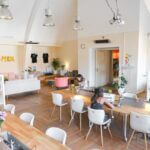Types of Coworking Spaces
Coworking is defined as an office space where people are co-located and there’s a focus specifically on collaboration and community. Typically, coworking spaces include aspects such as shared desks or hot desks, private office options, meeting rooms and event spaces, shared kitchen area, printing facilities, high-speed internet and video conferencing equipment. At some of the higher-end coworking spaces, they have further luxury inclusions such as cafes, bars, gyms, yoga studios and gaming rooms.
With coworking spaces in Victoria growing at over 960% in the last 3 years, it’s no surprise that niche spaces, that focus on a particular subgroup of entrepreneurs, have emerged.
The Types of Coworking Spaces
Maker Spaces
Maker spaces are collaborative creative spaces where members can literally make their products or projects using the abundance of equipment such as 3D printers, saws, laser cutters, welding bays and sewing machines. Like a giant workshop, maker spaces allow their members to access the best equipment at an affordable price and all under the same roof. Not only do maker spaces have an abundance of equipment, they also often include storage as well as inhouse experts to help you use the machinery and tools. Notable maker spaces include Fab 9 and Space Tank Studio.
Women-centric Coworking
One Roof is leading the way for women-centric coworking spaces, not only in Australia but around the world. Founder Sheree Rubinstein started One Roof after becoming frustrated with the unique challenges that women face in the workplace and with entrepreneurship. One Roof’s mission is to make Australia the best place for a woman to start a business, and to do this, it does not only provide a beautiful workspace, but also wellness sessions, meditation classes, business support sessions and networking lunches.
Industry-specific Coworking
There are a number of industry-specific coworking spaces that have popped up in recent years including coworking dedicated to fintech startups, creatives and social impact businesses. These spaces aim to strengthen their given industry by promoting collaboration over competition. By connecting like-minded individuals, these spaces can add incredible value to each of their members through the power of networking and skill-sharing. Notable spaces in this area include Framework for creatives, Our Community House for purpose businesses and the social sector, and York Butter Factory for fintechs.
Multi-use Coworking
Coworking spaces have also begun emerging from already inhabited spaces to transform them into multi-use spaces. For example, it was announced in September 2019 that Melbourne Airport will be getting its first coworking space in conjunction with Accor hotels group. Another innovative coworking business that has recently expanded overseas is Two Space. Two Space converts underutilised spaces such as restaurants and cafes that are closed for a portion of the day, into coworking spaces. They have over 20 sites on their books including restaurants, cafes, hotels and even a brewery!
With coworking continuing to boom, we’re likely to continue seeing the market fragment into even more different types of coworking spaces. What will be next? Personally, I’m hoping to see more spaces with mindfulness inherently integrated into their design (and dog-friendly spaces of course).

